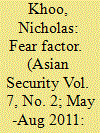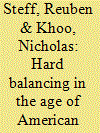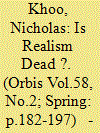|
|
|
Sort Order |
|
|
|
Items / Page
|
|
|
|
|
|
|
| Srl | Item |
| 1 |
ID:
053271


|
|
|
|
|
| Publication |
Apr-Jun 2000.
|
|
|
|
|
|
|
|
|
|
|
|
|
|
|
|
| 2 |
ID:
106703


|
|
|
|
|
| Publication |
2011.
|
| Summary/Abstract |
In the face of China's seemingly inexorable rise, how fearful are the key actors in Northeast Asia? Relatedly, how fearful are they likely to be in the future? The academic debate on these questions is characterized by starkly contrasting answers. A typology of the literature is developed whereby analysts are categorized under the rubric of fear deflation, fear inflation, and fear qualification. Through an analysis of empirical survey data and developments during the 2000-2010 period, this article contends that the most appropriate way to characterize Northeast Asian responses to China's rise is via the lens of qualified fear. Through it, one can see that the states on China's periphery are - contrary to the arguments of fear deflaters - exhibiting qualified fear at how China's rising great powers capabilities are wielded. At the same time, levels of fear have not, and arguably will not, escalate to levels posited in the fear-inflation perspective.
|
|
|
|
|
|
|
|
|
|
|
|
|
|
|
|
| 3 |
ID:
131339


|
|
|
|
|
| Publication |
2014.
|
| Summary/Abstract |
One of the central debates in contemporary international relations scholarship concerns the issue of whether balancing has occurred in response to US-based unipolarity, and if it has, how this should be characterised. Existing research has seen analysts argue that major power responses to unipolarity can be placed in one of either three categories: an absence of balancing, soft balancing, and hard balancing. This article contributes to the scholarly literature by providing a case study of hard internal Russian balancing against the US's development and deployment of Ballistic Missile Defense (BMD) systems during the Bush Administration (2001-08). Russian hard balancing against the US has involved: (1) fielding new strategic nuclear and conventional weapons equipped with BMD countermeasures, and, relatedly, (2) making changes in military doctrine. As a result, security dilemma dynamics are increasingly in evidence in US relations with Russia.
|
|
|
|
|
|
|
|
|
|
|
|
|
|
|
|
| 4 |
ID:
129903


|
|
|
|
|
| Publication |
2014.
|
| Summary/Abstract |
The author contends that prominent strands in the recent literature on Asia's international relations reflect a lack of appreciation for the actual policy of regional states, which is deeply realist in orientation.
|
|
|
|
|
|
|
|
|
|
|
|
|
|
|
|
| 5 |
ID:
179537


|
|
|
|
|
| Summary/Abstract |
China’s policy toward North Korea’s nuclear weapons programme represents an empirical and theoretical puzzle. Contrary to political relationship theory, Beijing has opposed its ally North Korea acquiring nuclear weapons. And contrary to power projection theory, a favourable asymmetry in material power has not resulted in Beijing being able to persuade, or otherwise coerce Pyongyang into terminating its nuclear weapons programme. To understand China’s policy on the North Korean nuclear proliferation issue, the concepts of power and power projection need to be understood differently, in relational power terms. The relational view of power calls for the specification of scope, domain, the means, and the opportunity cost of alternative policy options. Once this is done, the limits and complexities of Chinese policy come into clearer focus.
|
|
|
|
|
|
|
|
|
|
|
|
|
|
|
|
| 6 |
ID:
128038


|
|
|
|
|
| Publication |
2014.
|
| Summary/Abstract |
Although the Obama Administration has differed from its predecessor in a number of respects, on the specific issue of Ballistic Missile Defense (BMD), there is a striking continuity. The Obama Administration has remained committed to the BMD project, even as it has modified the schedule of deployments and prioritized different systems from the Bush Administration. Significantly, this has led to Chinese and Russian balancing in the nuclear sphere. As a result, there is evidence of a security dilemma-type dynamics in US relations with China and Russia. At present, there is no study that analyzes Russian and Chinese hard internal balancing against the USA in the sphere of missile defense during the Obama Administration. This article fills this gap.
|
|
|
|
|
|
|
|
|
|
|
|
|
|
|
|
|
|
|
|
|